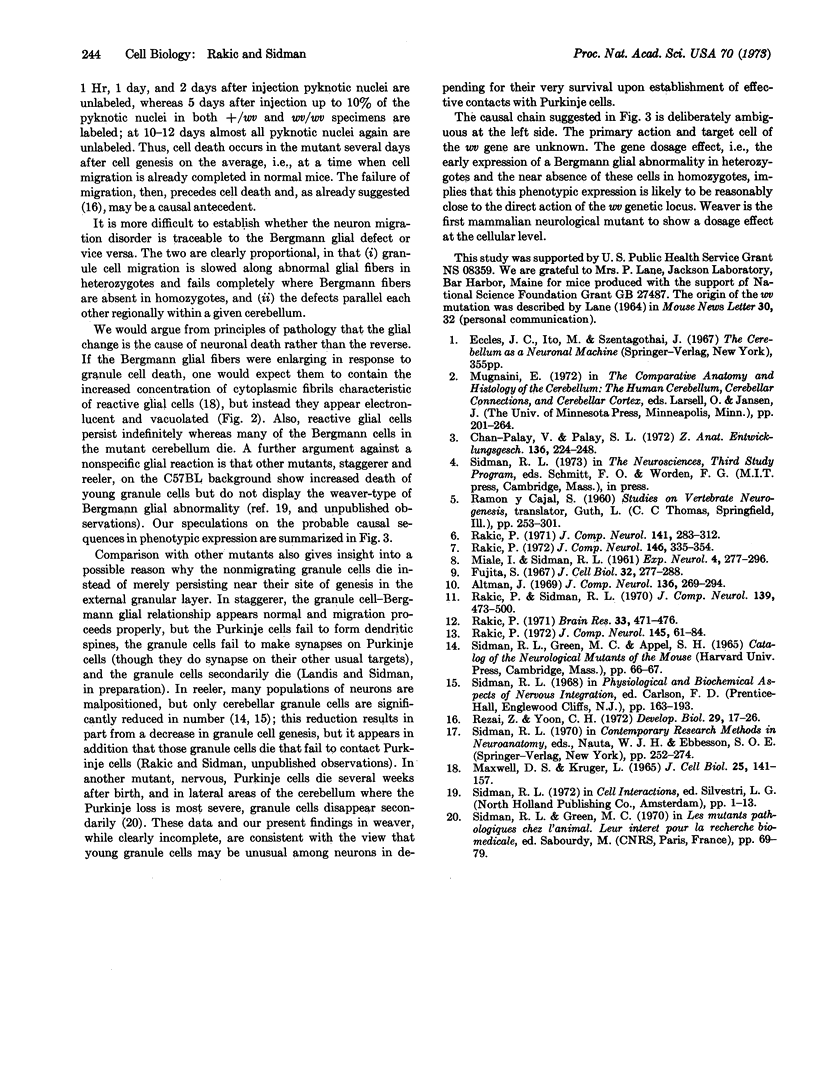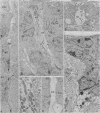Abstract
Previous work showed that in cerebella of mice homozygous for the autosomal mutation weaver, wv, most postmitotic granule cell neurons die during the first 2 weeks after birth close to their site of genesis in the external granular layer. Analysis of the less severely affected heterozygotes by electron microscopy and autoradiography indicates that granule cell death occurs several days after cell genesis and is secondary to failure of their somas to migrate across the molecular layer to the granular layer. This migration defect in turn appears secondary to a hitherto unrecognized disorder of Bergmann glial cells, the cells that normally guide the young neurons in their migration. In +/wv cerebella, Bergmann glial processes are enlarged and irregular in caliber, electronlucent, and often vacuolated; in wv/wv, Bergmann cell processes are almost absent. The primary genetic abnormality remains undefined, but the gene dosage effect, here recognized at a cellular level for the first time in a mammalian neurological mutant, suggests that even though neuronal death serves as the most prominent and clinically relevant phenotypic expression, the Bergmann glial abnormality may actually be closer to the primary cellular target of the wv genetic locus.
Keywords: cerebellar development, neuron-glial cell interaction, neurological mutant mice
Full text
PDF




Images in this article
Selected References
These references are in PubMed. This may not be the complete list of references from this article.
- Altman J. Autoradiographic and histological studies of postnatal neurogenesis. 3. Dating the time of production and onset of differentiation of cerebellar microneurons in rats. J Comp Neurol. 1969 Jul;136(3):269–293. doi: 10.1002/cne.901360303. [DOI] [PubMed] [Google Scholar]
- Chan-Palay V., Palay S. L. The stellate cells of the rat's cerebellar cortex. Z Anat Entwicklungsgesch. 1972;136(2):224–248. doi: 10.1007/BF00519180. [DOI] [PubMed] [Google Scholar]
- Fujita S. Quantitative analysis of cell proliferation and differentiation in the cortex of the postnatal mouse cerebellum. J Cell Biol. 1967 Feb;32(2):277–287. doi: 10.1083/jcb.32.2.277. [DOI] [PMC free article] [PubMed] [Google Scholar]
- MIALE I. L., SIDMAN R. L. An autoradiographic analysis of histogenesis in the mouse cerebellum. Exp Neurol. 1961 Oct;4:277–296. doi: 10.1016/0014-4886(61)90055-3. [DOI] [PubMed] [Google Scholar]
- Rakic P. Extrinsic cytological determinants of basket and stellate cell dendritic pattern in the cerebellar molecular layer. J Comp Neurol. 1972 Nov;146(3):335–354. doi: 10.1002/cne.901460304. [DOI] [PubMed] [Google Scholar]
- Rakic P. Guidance of neurons migrating to the fetal monkey neocortex. Brain Res. 1971 Oct 29;33(2):471–476. doi: 10.1016/0006-8993(71)90119-3. [DOI] [PubMed] [Google Scholar]
- Rakic P. Mode of cell migration to the superficial layers of fetal monkey neocortex. J Comp Neurol. 1972 May;145(1):61–83. doi: 10.1002/cne.901450105. [DOI] [PubMed] [Google Scholar]
- Rakic P. Neuron-glia relationship during granule cell migration in developing cerebellar cortex. A Golgi and electronmicroscopic study in Macacus Rhesus. J Comp Neurol. 1971 Mar;141(3):283–312. doi: 10.1002/cne.901410303. [DOI] [PubMed] [Google Scholar]
- Rakic P., Sidman R. L. Histogenesis of cortical layers in human cerebellum, particularly the lamina dissecans. J Comp Neurol. 1970 Aug;139(4):473–500. doi: 10.1002/cne.901390407. [DOI] [PubMed] [Google Scholar]
- Rezai Z., Yoon C. H. Abnormal rate of granule cell migration in the cerebellum of "Weaver" mutant mice. Dev Biol. 1972 Sep;29(1):17–26. doi: 10.1016/0012-1606(72)90039-5. [DOI] [PubMed] [Google Scholar]




